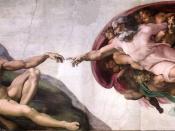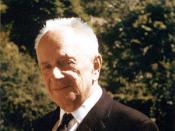The issue of teaching creationism in the public schools has long been debated. Over the years many different arguments have been made. First creationists tried to have the teaching of evolution outlawed. This issue went to the Supreme Court in 1968, where in _Epperson v. Arkansas_ the high court ruled against banning the teaching of evolution. Soon after this decision creationists began to call for 'equal time', or the equal treatment of creation theory and evolution theory. When this attempt also failed creationists turned to 'creation science' (Grunes 465). Today the major argument for the teaching of creationism in public schools is that creationism is a scientific theory and thus should be taught alongside evolution. The combatants against creationism being taught in public schools are those who believe creation science is bad science and those who believe it violates the separation of church and state. Supporters of creation science are organizations that are collectively referred to as the New Christian Right, such as the Institute for Creation Research. On the other hand, those who oppose creation science are usually scientists, educators, and civil liberties organizations (Grunes 466).
The majority of those people who desire for creationism to be taught in the public schools cite that it is scientific. They push for the teaching of creation science which is defined as "scientific evidence for creation and the inferences from that evidence" (Tatina 275). The inferences from that evidence are "sudden creation of the universe from nothing, recent formulation of the earth, creation of man and other biological kinds, a worldwide flood", and "the insufficiency of mutation and natural selection in bringing about development of living kinds from a single organism" (Grunes 470). These creation scientists, as they are called, want the teaching of the two scientific theories, evolution and creation...


